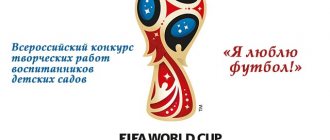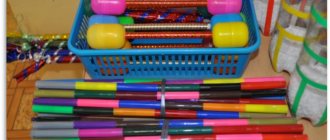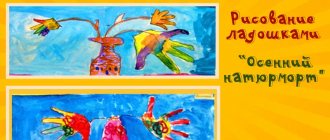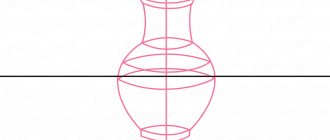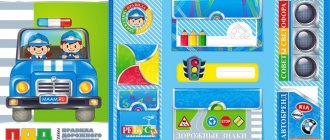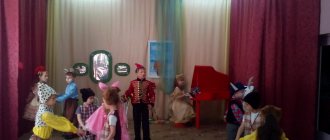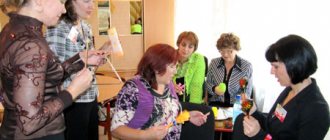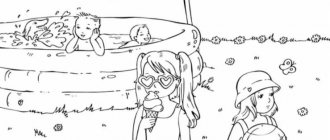Palm painting process
The child must be dressed in clothes that he does not mind getting dirty.
- You can also wear an oilcloth apron to protect children's clothes.
- It is better to use a large sheet for drawing. You can use a large piece of wallpaper or whatman paper. This is done so that the child can draw comfortably.
- If the child will draw on the floor, then it is better to lay oilcloth on the floor.
- First, paints diluted with water are poured into plastic plates. This is done to make it convenient for the baby to dip his hands.
- For drawing, it is better to take several primary colors at first.
- You can make handprints, draw lines, and so on on white paper.
It is necessary to prepare wet wipes and rags. This is done so that when
Paint Recipes
The technology called “Finger Painting” involves the use of paints. But many parents worry that they may be dangerous for the child. After all, many kids taste them, and they contain many harmful chemicals.
Some mothers prepare their own paints. The ingredients are quite simple:
- 2 tbsp. flour;
- 1.5 tbsp. water;
- 7 tbsp. l. salt;
- 1.5 tbsp. l. vegetable oil;
- glycerol;
- food colorings.
First you need to mix the dry products - flour and salt. Add water to them and stir until thick sour cream forms. Then add vegetable oil. The ingredients can be mixed with a whisk, fork, mixer or blender. Glycerin is added as desired, it gives the paint shine.
The finished mass is poured into different jars; you can use empty containers from gouache or baby puree. Then you need to add dyes. They can be natural - juice of carrots, beets, celery, turmeric. You can also use food colorings that are added to baked goods.
At home, you can prepare three-dimensional paints for finger painting. You will need few ingredients:
- 1 tbsp. flour;
- 1 tbsp. salt;
- 2 tbsp. water.
The products must be thoroughly mixed and placed in different containers. Then dyes are added to them. For additional shine, glitter or glycerin is added to the mixture. Next, the jars are placed in the microwave for 1.5 minutes at 180 degrees. The result will be a voluminous material. While drawing, the paints will lie on the paper so that any image will acquire a 3D effect.
You can also use porridge for cooking:
- 0.5 tbsp. fine-grained cereals;
- water;
- dyes.
Semolina is suitable for creating paints; it is quite small. It is cooked according to the usual recipe; the consistency of the porridge should resemble sour cream. For greater viscosity, you can add PVA glue to the mixture. The mass is also laid out in small jars and mixed with dyes. This material will also allow you to create three-dimensional drawings. But after applying it to paper, you need to handle the painting more carefully - it must dry. You can fix the cereal with regular hairspray.
Advantages of the palm painting process
The baby's hand muscles develop during the process of drawing.
- The child begins to distinguish colors.
- The baby's creative abilities appear.
- Motor skills develop.
- The baby begins to distinguish different shapes.
- By learning something new, the baby prepares for school.
- Children's horizons are expanding.
Summary of GCD in fine arts in the middle group “Drawing the human figure”
Mnatsakanyan Marina
Summary of GCD in fine arts in the middle group “Drawing the human figure”
Goal: teach children to draw a human figure .
Educational: learn to draw a human figure , adhering to the correct proportions; show in the drawing the structure of the human figure (head, torso, legs, etc.)
;
continue to introduce the main parts of the body; consolidate knowledge of geometric shapes .
Developmental: develop the ability to hold a pencil correctly and perform simple actions with it; develop fine motor skills of the hands; diligence; desire to draw .
Educational: cultivate neatness and perseverance; desire to learn new things; interest in the result obtained.
Equipment and material: demonstration board, marker, pictures of a person .
Handouts: sheets of paper, pencils (for each child)
.
Preliminary work: conversations with children about the human , about the functions of parts of the human . Looking at pictures of a person . Making riddles on the topic: “Parts of the human ”
.
What you need when drawing with your palms
You can draw on A4 or A3 paper, cardboard, a piece of wallpaper, notebook paper, and so on. You can be creative in an album. There is only one requirement. The paper should be thick.
Paints include both watercolor and gouache. It is better to paint with bright colors. It will be beautiful if there are sparkles on the paint. Kids really like unusual colors.
The oilcloth must be laid on the work surface. You can also lay a special rug. This is done to prevent children from getting the table dirty.
Tips for parents
Parents should show the little ones exactly how to draw a picture with their fingers. The unusual technique of fine art should interest the child. Use your fingertip to scoop up some paint and make a dot or draw a line on the paper. The baby can repeat this. But you can draw not only with your fingers, but with your entire palm.
Older children enjoy using ready-made templates. You can find them on the Internet and print them or draw them yourself. These are images of fruits, vegetables, animals, transport. They are usually already painted, but have white areas. The child must paint them so that the colors match, or trace the outlines of the drawings .
There are popular pictures that kindergarten teachers use. The finger painting technique is also suitable for depicting natural phenomena. A child can draw the sun, rain, snowfall, and starry night with his hands.
The background is painted over with your fingers, evenly distributing the material over the paper. But you can use colored cardboard. Large images - sun rays, clouds, fish, flowers - are drawn with palms. And small details can be depicted with little fingers, cotton swabs and even toothpicks.
Finger painting will allow you to prepare greeting cards and themed posters for kindergarten. The child will be able to take part in decorating the house for any holiday. And parents will help kids master more complex painting techniques with each new lesson.
When to start drawing
Already a six-month-old baby can begin to teach drawing with his palms. After all, it is from this age that children begin to sit, and they begin to learn more and more new things. This exercise helps develop motor skills.
Secrets of drawing with palms
- To paint with your palms you need special paints. They do not harm babies. They taste so bitter that the children themselves will not want to try them anymore. It is necessary to ensure that the child does not put his hands in his mouth.
- If it is not possible to buy special paints, then regular gouache will do.
- It is better for small children to draw on the floor. You can lay regular oilcloth there so that everything around doesn’t get dirty.
- To ensure that the paper does not move out, it is constantly secured with tape.
- At first, they draw for five minutes a day. Then you can increase it to 30 minutes.
- A child should draw only if the child is in a good mood.
- Some parents only draw with their children in the bathroom. After all, if the baby gets dirty, it will be easier to wash him. Kids love to draw on the tiles in the bathroom.
It is necessary to supervise the child while drawing. You can't leave him alone.
Features of finger paints
- Suitable for drawing with palms.
- Harmless. They have no toxic substances. Contains food coloring.
- It is better to add more salt to the paint so that the child no longer wants to put the paint in his mouth.
- Such paints can be easily washed off the skin.
- Paints are washed off from any clothing.
How to draw the sun with your palms
- You can draw the sun from the age of 12 months.
- For drawing, use a piece of blue paper or cardboard. After all, the color blue represents the sky.
- While drawing, the child sits on the lap of one of the parents.
- Then you need to draw a circle in the center of the sheet.
- The baby draws the rays of the sun with his palms.
- Mom or dad directs the child's palms in the right direction.
- You can also draw the eyes, nose and mouth of the sun.
Benefits of classes
Drawing in an unconventional palm technique will allow the child to develop the muscles of his hands, and parents will be able to establish psychological contact with the baby. Such activities not only entertain, but also bring benefits:
- develop motor skills;
- give new knowledge about the shapes of objects;
- teach color recognition;
- develop taste.
Regular finger painting classes allow you to strengthen your hand muscles and develop motor skills, and this has a beneficial effect on speech and abstract thinking. The child will be able to learn about new objects by depicting them, and will also become familiar with geometric shapes, different colors and shades. Such home lessons will help parents prepare their child for the first grade of school.
Small objects help develop coordination of movements. Children will be able to expand their horizons and gain new tactile and visual sensations. The child will receive many pleasant emotions from creative activities, he will develop a taste and a craving for beauty. Children express their experiences through colors. Each drawing reflects the joys and fears of a child. Parents should pay attention to what exactly he depicts.
You can start classes from 10-11 months, but the baby should draw only with the help of his parents. It is better to make the first lessons short - 5-10 minutes. Over time, they can be extended to 20-30 minutes.
You should not force your child to draw; it is better to observe his mood. Creativity requires a good mood and inspiration.
How to draw a fire
A fire is very easy to draw. Below you need to paint two thick stripes with brown paints. They will represent logs. And draw a palm on top with yellow or orange paint. This is how easy and simple it is to create a fire.
- You need to dip your hand into pink or red paint, fingers down. Then dots are painted with black and white paints. Leaves are painted with green paint.
- Four marks from the baby's palms are drawn with fingers down. A circle is drawn on top of the very first palm, which will represent a face.
- If you dip your baby’s palm in yellow paint, this is how you paint mermaid hair. And with the help of a palm with green or blue paint they depict a tail.
- Using gray color you can very easily depict a dolphin. All that remains is to paint the sea in blue.
- You can very easily draw a zebra from one white handprint of a baby. All that remains is to finish drawing the tail. And you will also need black stripes on the white palm mark.
Using two palms you can very easily depict two swans.
Features of drawing with palms
- When drawing, a child should never be left unattended by adults. After all, a child can taste the paint. And this is very dangerous. Parents should help and suggest how to draw.
- It is necessary to prepare a workplace for the baby to draw. A child can smear paint all over everything. It's better to be well prepared. Wear clothes that you don't mind getting dirty. The work table must be covered with oilcloth.
- At first, you can’t practice for more than five minutes. After all, little children get tired quickly.
- For kids, it’s better to pour the paint into a saucer. This will make drawing easier for them. It is not very easy for children to get paint out of narrow dishes.
- It is better to place a bowl of water nearby. This is done so that the child, if he gets dirty, can wash his hands or face.
- You need to have a towel nearby. Only it should be old or such that you wouldn’t mind spoiling it.
- It is better for babies under one year to draw not on the table, but on the floor. The carpet is removed from the floor. If there is furniture nearby, then it also needs to be covered with oilcloth.
Drawing “Underwater world”
This activity is recommended for children aged 2 to 4 years. At the first stage, parents and their child create a background; it can be easily covered with blue paint using:
- Pieces of sponge.
- Crumpled paper.
- Cotton pad.
The rocky bottom is created by short finger strokes. The color of the pebbles can be any, depending on the imagination of the children and their parents. With vertical long wavy lines of green and red, the mother draws several seaweeds - and invites the baby to repeat her movements.
After the background is completely drawn, you can begin to depict the fish. An adult invites the child to dip his palm into one of the prepared saucers with paint.
After this, the baby’s palm print is left anywhere in the drawing. In this case, the direction of the fingers should be horizontal relative to the drawn bottom. The thumb, imprinted on the paper, will represent the fin of the fish, and the remaining fingers will leave a mark similar to its tail.
All fish should be of different colors; the eyes and mouth are drawn on them at the end of the work with the child’s finger.
Photos of hand painting for children
Drawing "Carrot"
The easiest thing to do. Can be used with children under 1 year of age.
Parents draw the root crop according to a template or by hand. The upper green part of the plant is drawn with the child’s palm.
While working, the mother pronounces the names of the colors used.
Tulips
This class teaches the elements of appliqué and palm painting. Recommended for children aged 1 to 3 years.
The child's handprints in yellow and red depict flower cups.
The mother cuts out the stems and leaves of the flower from green paper and glues it together with the child.
Festive fireworks
The drawing is made using pieces of cotton wool, tightly tied with threads in the shape of a ball (polyethylene or a sponge are suitable for this purpose). Each color should have its own cotton ball.
The basis is a black sheet of paper or cardboard.
The mother makes the first strokes with cotton stamps herself, then invites the child to repeat her actions. When enough colored balls have already been depicted, use your fingers to draw several vertical lines slightly inclined from the center.
The drawing is ready.
